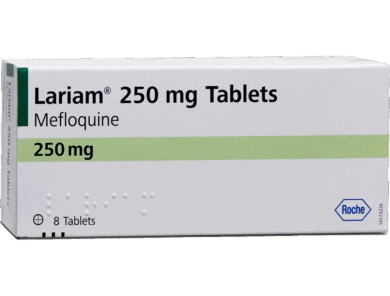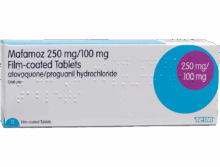
Lariam Tablets 8 to 19 tablets
from
£24.99
Lariam is an antimalarial medication, containing the active ingredient mefloquine. It needs to be taken once a week, starting 1 week before entering the malaria zone, whilst there and for 4 weeks after.
Lariam Tablets 8 to 19 tablets
Buy Lariam Tablets
Buy 250mg Lariam tablets online today and receive them on next day delivery, upon prescription approval.
Lariam Prices
| Name & Dosage | x8 Tablets (1 Week) |
x9 Tablets (2 Weeks) |
x10 Tablets (3 Weeks) |
x11 Tablets (4 Weeks) |
x12 Tablets (5 Weeks) |
x13 Tablets (6 Weeks) |
x15 Tablets (8 Weeks) |
x19 Tablets (12 Weeks) |
|---|---|---|---|---|---|---|---|---|
| Lariam 250mg Tablets (1 Week) |
£24.99 | |||||||
| Lariam 250mg Tablets (2 Weeks) |
£26.99 | |||||||
| Lariam 250mg Tablets (3 Weeks) |
£27.99 | |||||||
| Lariam 250mg Tablets (4 Weeks) |
£29.99 | |||||||
| Lariam 250mg Tablets (5 Weeks) |
£31.99 | |||||||
| Lariam 250mg Tablets (6 Weeks) |
£33.99 | |||||||
| Lariam 250mg Tablets (8 Weeks) |
£38.49 | |||||||
| Lariam 250mg Tablets (12 Weeks) |
£47.99 |
Summary for Lariam Tablets
| Medication Class | Antimalarial |
|---|---|
| Mechanism of action | Interferes with the growth and replication of the malaria parasites in red blood cells |
| Active ingredient | Mefloquine |
| Strength | 250mg |
| Effective within | Clinical improvement in malaria symptoms within 48 to 72 hours of starting treatment |
| Dosage Instructions | One tablet of 250mg per week |
| Manufacturer | Neon Healthcare Ltd |
| Use with alcohol | No |
About Lariam tablets
Key Points
- Highly effective anti malaria tablets
- Kills the malaria parasite
- Treatment starts one week before you travel
What is Lariam?
Lariam malaria tablets are a medication used to prevent and treat malaria. It is the brand name for mefloquine and is taken before, during and four weeks after coming home from your destination.
How does Lariam work?
The active ingredient in the Lariam tablets is Mefloquine hydrochloride, a preventive drug against malaria. Lariam protects the body from malaria by killing the parasites after its release from the liver into the bloodstream and interferes its growth in the red blood cells.
What if I miss a dose of Lariam?
If you miss a dose of Lariam, then take it as soon as you remember to take it. Continue taking the next doses weekly from the day on which you have taken the missed dose. Avoid taking more than one tablet a week.
Lariam alternatives
Lariam vs Atovaquone/Proguanil
- Lariam and Atovaquone/Proguanil can be used as malaria prevention tablets or as a treatment for the disease
- Atovaquone/Proguanil is taken once a day, while Lariam is taken one a week
- Atovaquone/Proguanil has a low side effect profile and may be more suitable for people who are at higher risk of experiencing side effects
- Atovaquone/Proguanil is not suitable for children who weigh less than 11 kg, while Lariam is not suitable for children who weigh less than 5 kg
Lariam vs Doxycycline
- Doxycycline for malaria is an antimalarial drug that works to prevent and treat malaria
- Doxycycline is taken daily, while Lariam is taken weekly
- Both Doxycycline and Lariam are particularly effective in areas with multidrug-resistant P. falciparum – the most dangerous and drug-resistant malaria parasite
- Doxycycline may be a suitable alternative to Lariam for people with a history of mental illness
Lariam prevention
Lariam is effective in preventing malaria. It is an antimalarial medication recommended for prophylaxis, especially in areas where malaria is known to be caused by Plasmodium falciparum. Clinical studies have shown that its efficacy can be over 90% when taken as directed.
Lariam ingredients
Active ingredient: mefloquine hydrochloride
Inactive ingredients: poloxamer, microcrystalline cellulose, lactose monohydrate, maize starch, crospovidone, ammonium calcium alginate, talc, and magnesium stearate.
Lariam Dosage Instructions
How to take Lariam tablets
The recommended preventive dose of Lariam is one tablet of 250mg per week. It should be taken on the same day of the week, depending on the duration of stay in the malarial region.
- Start taking the tablet one week before arrival to the malarial area (prophylactic treatment)
- Take one tablet every week throughout your stay
- Continue taking the pill for four weeks after leaving the area (to inhibit the reproduction of parasites, if you have infected)
The dose to be taken is adjusted according to the bodyweight of the person.
- For adults weighing 45kg or more, the dose is one tablet per week.
- For adults or children weighing 31 to 45kg, the treatment is three-quarters of Lariam tablets.
- Adults or children weighing a range of 20 to 30kg should take half a pill once a week.
- Children weighing from 5 to 19kg should take a quarter of a tablet.
It is advisable to consult your doctor or pharmacist before taking the tablet to have a proper dose adjustment. Lariam should be taken with a glass of water or milk, preferably not on an empty stomach.
Lariam Side Effects
Some people can experience serious mental problems caused by Lariam and in these cases, Lariam should be replaced with another medicine to prevent malaria.
If you have any of the following side effects while taking Lariam, stop taking this medicine and contact your GP immediately:
Common (up to 1 in 10 people):
- Depression
- Anxiety
Other malaria tablets side effects are possible, such as:
Very common (more than 1 in 10 people):
- Sleeping problems
Common (up to 1 in 10 people):
- Feeling dizzy
- Headache
- Vision problems
- Vertigo
- Nausea and vomiting
- Diarrhoea
- Tummy ache
- Itching
Please note: Depression, dizziness, and loss of balance may persist for months or longer, even after you have stopped taking Lariam.
Lariam Warnings
People with the following disorders must consult their doctor to find out whether the Lariam is safe for them or not if they have:
- Heart disease
- Epilepsy
- Liver disease
- Diabetes
- Blood clotting problem
- Patients taking blood-thinning medicines such as warfarin, Coumadin, Jantoven etc
- People who have had blackwater fever, a severe malarial complication
- Vision problems
- Low blood glucose
- Inflammation of the lungs, also known as pneumonitis
- Neuropathy with signs, e.g pins and needs, numbness
- Blood or lymphatic disorder
- Kidney problems
- Heart problems, especially changes in heart rhythm
- Previously contracted malaria even though you were taking Lariam tablets for malaria prevention
- Experienced a mild to serious potential life threatening allergic reaction to Lariam or any of its ingredients
Important: Your heartbeat can slow to a dangerous level if Halofantrine, which also treats malaria, and Lariam is taken at the same time. You must not take Halofantrine if you are already taking or have taken Lariam within the last 15 weeks.
Speak to your doctor immediately if you are already being treated with Halofantrine, or you have been prescribed a course of Halofantrine.
Specific precautionary measures should be taken if you are suffering from any underlying health condition and should be consulted in detail with your doctor. Some of the conditions that can develop and maybe life-threatening are:
Anaemia
Lariam can cause a decrease in red blood cells to count. If the symptoms of low blood count like shortness of breath, feeling tired or pale skin appear then contact your health service provider.
Dizziness
In some patients’ dizziness and loss of balance can occur after the use of Lariam. If you are suffering from any such problem, then do not perform the tasks that require alertness like driving or operating machinery until you feel fit to do so.
Heart Problems
If you suffer from any kind of palpitation or irregular heartbeat, contact medical help as soon as possible to avoid any threatening situations.
Dose adjustment in some cases
The dose of Lariam must adjust in patients suffering from kidney or liver disorders. In such patients, the blood levels of the drug can rise more than usual and need a reduction or adjustment in the standard dose. Patients having kidney and liver disorders should not take medicine without consulting a doctor or pharmacist.
Mental Health Problems
Some psychiatric and nerve problems can occur in some people taking Lariam. In some cases, these effects sustain for 6 months, 1 year or sometimes remain permanently after the treatment with Lariam. Immediately consult the doctor if you are experiencing any of these issues.
Epilepsy
Lariam can increase the chances of seizure attacks in persons having a history of epilepsy. These patients should not use Larium to protect malaria and only use it for treatment when benefits are more than risks.
Lariam Interactions
It is essential to talk to your doctor or pharmacist about any other medication that you are taking before starting Lariam. Particularly medicines can have a drug interaction when taken in combination with Lariam. Similarly, it is equally important to check the drug interaction between Lariam and to start any new medicine.
- Antiarrhythmics (drugs used in the treatment of irregular heartbeat)
- Antihistamines (cetirizine, loratadine, diphenhydramine etc.)
- Alcohol
- Antidepressants (citalopram, escitalopram, clomipramine)
- Other antimalarials
- Antipsychotics (thioridazine, haloperidol, amisulpride)
- Moxifloxacin
- Pentamidine
- Atomoxetine
- Beta-blockers such as atenolol
- Calcium channel blockers
- Crizotinib
- Digoxin
- Antipsychotic drugs like chlorpromazine
- Antifungals
- Antibiotics
It is better to seek advice from the doctor for safe use of medicines and all possible interactions of the Lariam.
Lariam and Pregnancy/Breastfeeding
Pregnant women are more at the stake of having malaria, so it is better to avoid the malarial region as a precautionary measure. The risk of stillbirth, miscarriage, and neonatal death increases if the expecting mother suffers from malaria. If it is unavoidable to go, then you should use repellents to avoid mosquito bites.
Regarding the safety of Lariam in pregnant women, it has not been completely established. However, Lariam may be approved when there is increased risk of medical problems due to malaria than any other threat associated with Lariam intake. As the safety of the drug has not been completely developed, women should use contraceptives to avoid pregnancy when they are on Lariam therapy and up to three months after stopping Lariam intake. If you are pregnant, then there is no reason to terminate the pregnancy.
Although a minimal amount of drug passes into the breast milk and is not dangerous for feeding infants, it is better to take your doctors’ advice if you are a nursing mother. A nursing mother should only take Lariam if its benefits outweigh any risk that is associated with the infant on breastmilk.
It is vital to consider that the amount of medicine passed in mothers’ milk is not enough to protect the baby against malaria. In case of need, the baby should be given its dose of Lariam to be protected against disease. Whereas if both mother and infant are taking Lariam, then the amount of drug passed in the infant should be closely monitored particularly in low weight babies.
Product Reviews
product rated 4.6/5
It was very effective
By customer (via TrustPilot)It was very effective
By Customer (via Reviews.io)Good product and well cover with patient details
By LeParrain (via TrustPilot)Reasonably priced, well packaged and good communication
By Sherry Marshall (via TrustPilot)Superintendent Pharmacist
Written by Chemist Click
First created 23rd April 2025
Last reviewed 2nd October 2025
Other options include:

Our Awards & Certifications
Our team of experienced pharmacists and healthcare professionals are dedicated to providing the highest level of care and service to every customer, ensuring that they receive the best possible healthcare experience.

Our Clients Say:
Constantly good service, always very quick to deliver items.
By Phil ElliottHighly recommend. Fast delivery. Reliable.
By Carlene GraceHad a great experience, right from consultation to med delivery it was very efficient and professional. Thanks.
By Shefali PathakEasy to navigate website, regularly use their service, prompt timely delivery, discounts for regular customers could be considered.
By ArunI shopped around before purchasing and items price was good. Delivery was prompt and P+P reasonable. Item was as described. Good service.
By Mark LockettGood website, intuitive with great information. Efficient, from payment through to delivery, and good communication updates all the way.
By Graeme WalkerExcellent service. I ordered some meds which was dispatched very quickly and arrived super fast. The meds has a very long expiry date. I would definitely order again. Many thanks.
By Ian TBest company there is for me. Great service and excellent quality plus pricing is perfect. I wouldn't want to use anyone else in all honesty. I have recommended this company to all my friends. It's a tricky subject for us older guys but this company makes it all respectful and they discretion is very much appreciated by us all.
By Mr Franklin







